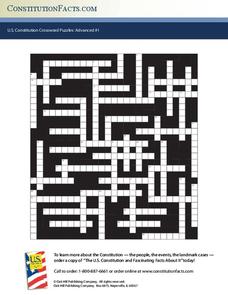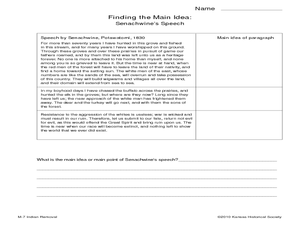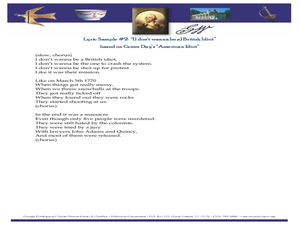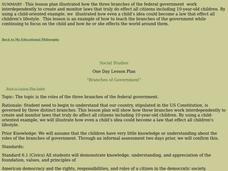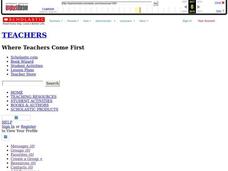National Endowment for the Humanities
Lesson 1: The United States Confronts Great Britain, 1793–1796
After the Revolutionary War, the success of the United States was far from guaranteed. Foreign powers coveted the new land, and Great Britain challenged American sovereignty. Learners consider the challenges facing the new nation using...
DocsTeach
The School Lunch Program and the Federal Government
The school lunch program is rooted in the struggles of the Great Depression and is still assisting families today. Academics research documents and images relating to the creation of the school lunch program. Scholars use a worksheet to...
Constitution Facts
U.S. Constitution Crossword Puzzles: Advanced #1
What do Boston Harbor, the Electoral College, and Chief Powhatan have in common? They all represent vital moments in American history—and they are all clues in a thorough and challenging crossword puzzle about the United States...
Curated OER
The Beginnings of Constitutional Government
Students examine excerpts of Thomas Paine's Common Sense. In this early American history lesson, students read Paine's pamphlet and analyze the information according the rubric provided.
Curated OER
Indian Removal to the Great American Desert
Seventh graders examine American policies to relocate Native Americans. In this Native American history lesson, 7th graders determine why Native Americans were relocated and investigate their response to the policies as they analyze...
Curated OER
Native Americans
Learners choose two photographs and explain how they illustrate traditional Native American culture. They discuss how traditional Native American culture has been affected by two specific actions of the United States Government, (they...
Curated OER
Comparing Utah's Past and Present Government
Fourth graders research the past and present forms of government in Utah. For this government studies lesson students analyzes different forms of government and work with a group to gather information about how Utah was/is run and then...
Curated OER
American Colonists Protest Song
Middle schoolers explore the role of protest songs. In this early American history instructional activity, students research the acts passed by the British that angered colonists. Middle schoolers then listen to protest songs from...
Curated OER
Giving Voice to History
Students examine the plight of Japanese Americans during World War II. In this World War II lesson, students participate in a mock evocation simulation, research primary and secondary documents about internment camps, and share their...
Curated OER
Documents and Symbols and American Freedom
Students complete a unit of lessons on the documents, symbols, and famous people involved in the founding of the U.S. government. They create a personal bill of rights, write a found poem, design a flag, conduct research, and role-play...
Curated OER
Dorothea Lange and the Relocation of Japanese Americans
Young scholars consider the relocation of Japanese Americans during World War II. In this Japanese relocation lesson, students examine photographs by Dorothea Lange, the "Pledge of Allegiance," and a US government flyer from 1942. They...
Curated OER
Branches of Government
Students explore the three branches of government. In this government and U.S. history instructional activity, students listen to a story about a boy who attempts to sponsor a bill to ban cartoons. Students interview three teachers who...
Curated OER
From Jim Crow To Linda Brown: A Retrospective of the African-American Experience from 1897 to 1953
Students examine African American issue between the years 1897 and 1953. In this African American history lesson, students research the social, economic, and political conditions of African Americans during the aforementioned time span...
Curated OER
American Justice on Trial
Students role play a trial in which they consider if the United States government violated the rights of Japanese Americans after Pearl Harbor.
Curated OER
Lewis and Clark and Native Americans, Part II
Students research the Native Americans living in the regions explored by Lewis and Clark. They identify the modern-day names of sites claimed by the Lakota Indians, and create a poster of the original Native American names.
Curated OER
Native Americans in Utah History: Research Project
Students research the basic cultural information available on the various Native American cultures of Utah. They investigate the historical time period, shelters, weapons, tools, foods and methods of obtaining food.
Curated OER
Letters from the Japanese American Internment
Learners explore the concept of Japanese internment. In this Japanese internment lesson, students examine primary sources that enable them to discover what internment camp life was like and its implications, Learners write their own...
Curated OER
A Salute to American Symbols
Students research American symbols. In this American History lesson, students listen to the story The Wall and discuss the Vietnam Veterans Memorial. They also listen to One Nation and research an American Symbol to create a...
PBS
African-Americans in the American West
Secondary learners explore the westward movement of African Americans. Segmented into four time periods, the lesson provides an overview of how African Americans experienced westward expansion. Learners view PBS specials on the...
Curated OER
American Revolution and Constitution Take-Home Assessment
In this early American history worksheet, learners draw diagrams of that feature the responsibilities of each of the 3 branches of the federal government and then create their own original visuals that highlight the formation of American...
Curated OER
U.S. History Worksheet #73
Explore how the 14th Amendment changed the way the United States operated, both politicallay and socially. In this United States history worksheet, students utilize a word bank of 10 terms or phrases to answer 10 fill in the blank...
Museum of Tolerance
Citizenship Then and Now: Comparing Ancient Rome and Contemporary American Society
Class members research citizenship in Ancient Rome and in the United States and use the provided graphic organizers to compare the rights and responsibilities of citizens in these two democracies.
Reading Through History
Anti-Federalist Paper No. 47
The path to a more perfect union was rockier than most history books would lead you to believe. Young historians read “Antifederalist No. 47,” written by James Madison (under the pen name “Centinel”), which sharply criticizes the...
Smithsonian Institution
Native Resistance: Native Resistance Then and Now
Native Americans lost so much—and gained so little in return. Scholars explore Native Americans' resistance to the United States government. The lesson uses primary sources to explore the different forms of protest and gives a voice to...




